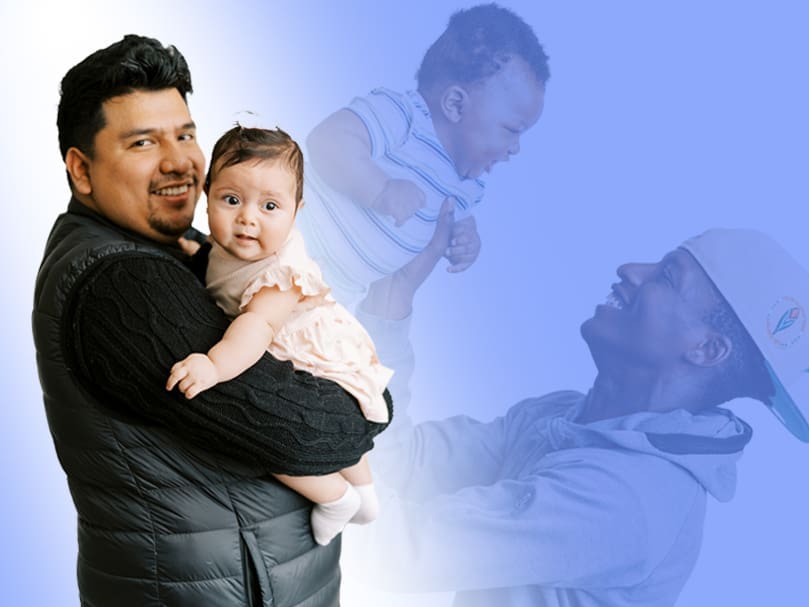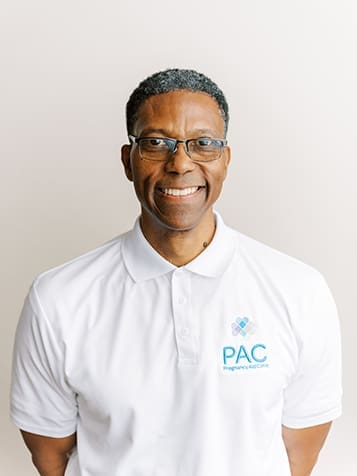 Photos by Christine Clements/Christine Marie Photography.
Photos by Christine Clements/Christine Marie Photography.Atlanta
Pregnancy Aid Clinic fatherhood sessions, program highlight men’s mental health
By NATALIA DURON, Staff Writer | Published June 7, 2024
ATLANTA—Andre White, fatherhood program and facilities manager at Pregnancy Aid Clinic, understands the heavy burden fathers feel when they cannot fulfill the perfect “dad” role. There is so much pressure to hold up the unit, White said.
As the only male advocate at PAC, White mentors fathers through a program that teaches men skills that strengthen their role as a parent.
The Fatherhood Mentoring program helps current and future fathers learn the responsibilities of a fatherly role model. Courses about budgeting, diaper changing and communicating, among others, are included.
“We touch on health, finance, career opportunities and also on how the fathers should interact with mothers to give her the support she needs,” White said.

Andre White, fatherhood program and facilities manager at Pregnancy Aid Clinic. Photo by Christine Clements/Christine Marie Photography
The persistent expectation placed upon fathers to be leaders can be mentally exhausting. According to UT Southwestern Medical Center, one in 10 fathers experience postpartum depression and anxiety.
Starting June 10, in observance of Father’s Day and Men’s Mental Health Week, White will extend the fatherhood program by hosting online sessions for men to discuss their mental health as father figures.
White will invite fathers to communicate their feelings and understand their mental stability as a dad. For many, fatherhood is not an easy task, and the stigma surrounding their willingness to parent hinders their ability to do so, White said. Through these sessions, parents can strengthen the family dynamic by conquering mental health issues.
Men have generationally been forced to hold everything back, and it has inherently affected many families, White said. Most fathers can find it difficult to express their emotions. Through the online sessions, White said he will help them with exercises to learn how important their words are.
“One of the simplest but most difficult things we have in our society is communication,” he said. “I want to help teach them how to communicate with their partner with what they need inside.”
White invites fathers of all backgrounds to attend the program and sessions: co-parents, fathers-to-be, single fathers or married fathers. The focus of the sessions is to ease the intensity of their emotions by placing their child or children at the core of their healing journey.
“We want to encourage the stigma about men not being involved by putting the frustration of the relationship between the mother and father aside and focusing on the child,” White said. “We will help them figure out how they need to keep their feelings or discourse for their partner out of their view of the child.”
The sessions will follow the style of the current fatherhood program and be led in a group setting. Being able to communicate a shared experience with others who relate will be a healing tool for many attendees, Courtney Cook, director of education, said. Connection is important, especially among men, because so many young parents feel alone in their parenting journey, Cook said.
White is typically the first person that these men open up to. He assures them that the space they are in is safe and nonjudgmental. He hopes to continue helping men work through childhood trauma and mental blocks in the sessions.
“In the fatherhood program, I ask the men who grew up without fathers to think about the pain they had growing up, and I tell them, ‘You don’t want to do that to your child.’ That alone is how we work on their mental health and strengthen their role as dads.”
The focus of the program and online sessions is that men are not alone in their struggles, and that through spiritual and mental healing, they will be able to “be the leader, be the protector, be the role model and show up for their kids,” White said.